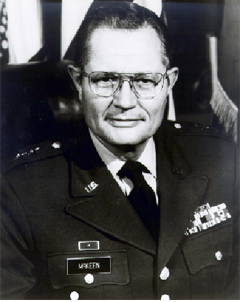Major General
Chester M. McKeen Jr.
 Chester M. McKeen, Jr.
received his commission as a second lieutenant upon graduation from the Ordnance Officer Candidate School in
1943 and served in the Pacific with the 362nd Ordnance Maintenance Company (Anti-Aircraft) during the
assault on Iwo Jima.
Chester M. McKeen, Jr.
received his commission as a second lieutenant upon graduation from the Ordnance Officer Candidate School in
1943 and served in the Pacific with the 362nd Ordnance Maintenance Company (Anti-Aircraft) during the
assault on Iwo Jima.
In 1947, he was assigned as a production Planning Control Officer at the Frankford Arsenal in Philadelphia where he developed a pioneering production control system using IBM punch-card technology. Taking advantage of the efficiencies gained from this system, he managed over $1 billion in new production work during the first year of the Korean War and subsequently assumed responsibility for the management of all fire control production for the Office Chief of Ordnance.
From 1954 to 1956, he served as Chief of the Management Section in the Comptroller Branch, Ordnance Division, HQ USAREUR. Charged with improving the Division's supply functions, he developed a centralized stock control system that used linked electrical accounting machines to track more than 140,000 items in depots scattered across France and Germany. Following Command and General Staff College and completion of the Military Assistance Institute, he was assigned to the Military Assistance Advisory Group, Vietnam in 1960. Then, he had consecutive assignments in the Requirements Division, Office of the Deputy Chief of Staff for Logistics (DCSLOG); Office of the Assistant Secretary of the Army, Installations and Logistics; the US Military Assistance Advisory Group, Germany; the US Arms Control and Disarmament Agency; and Headquarters, Department of Army, where he served as the Director of Materiel Acquisition for the DCSLOG. In this position, he was instrumental in developing and gaining Congressional approval for a $12 billion modernization plan for the Army's aging ammunition plants.
After a brief tour in Vietnam as Commander, US Army Procurement Agency, he was appointed Deputy Commander, US Army Tank-Automotive Command (TACOM). During this assignment, he initiated a program to enhance the performance of the Army's 2 ½-ton and 5-ton trucks, which enabled them to function effectively in sandy terrain.
In 1972, he reported for duty as Director of Requirements and Procurement in HQ, US Army Materiel Command and successfully negotiated a major contract with Saudi Arabia for 2 ½ and 5-ton trucks. This contract not only resolved a series of earlier international misunderstandings but also resulted in a production line that reduced the costs to the Army for subsequent buys.
In the last three years of his career, first as Project Manager for Tank Production Acceleration then as Commander, TACOM, he was largely responsible for accelerating the production of the M60 tank and upgrading the M48 series tank to the M48A5. Much to his credit, both programs were completed ahead of schedule and under cost.
MG McKeen retired in 1975 after 35 years of distinguished service to the Army and the Ordnance Corps.